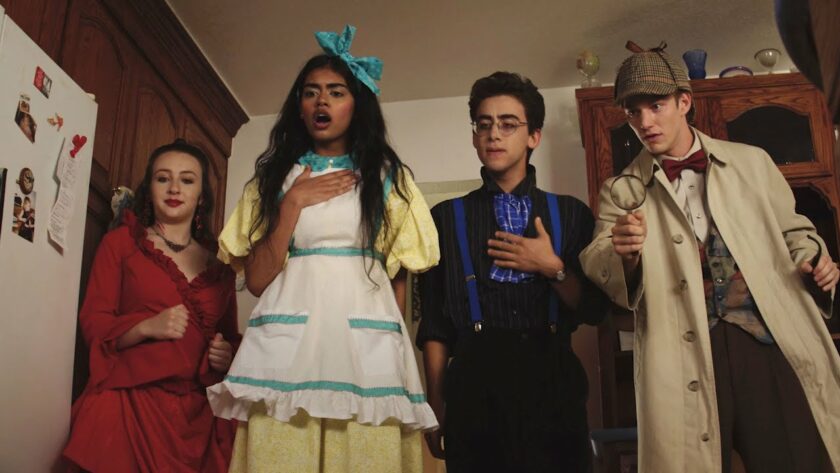Lydia De Matos reviews a comedic teen movie following a gang of theatre buffs as they explore their dramatic adolescence.
Now, let me state for the sake of the record that I, Lydia De Matos, was never a theatre kid. I may have acted in the occasional play at secondary school and gotten perhaps a little too into Hamilton circa. 2015, but the theatre was hardly my life. I did, however, have plenty of friends who were theatre kids, and therefore will claim a fair bit of familiarity with the type. This being the case, Jonathan Wysocki’s heartfelt coming-out comedy Dramarama was nothing short of a nostalgia trip.
A group of high school friends have organised a last hurrah before they all begin to leave for college. If you’re picturing the scene, you’re probably picturing it wrong, even if you did factor in the fact that I spent my introduction discussing theatre kids. Instead of the kind of no-holds-barred rager typical of the American Teen Comedy, the kids of this quiet Christian suburb are hosting a nineteenth-century literature themed murder mystery party, complete with intricately detailed Miss Havisham, Mina Harker, Sherlock Holmes, Dr Jekyll, and Alice in Wonderland costumes. The first act leans into the ridiculousness of the scenario and as a result, is raucously fun, playful in a way that reflects the childish spirit of its teenaged characters.

Coming out narratives can be a little tricky. There’s a distinct risk of a clichéd, overly-emotional moment, where everything is revealed through bleary eyes and the listeners react in one of two ways: 1. Acceptance and hugs, usually of the “We’ve known for a while, we’re so happy you could finally tell us” variety, 2. Homophobic rejection and/or dismissal. There’s nothing necessarily wrong with this, but after you’ve seen a few, it begins to feel like you’ve seen them all. Once a film establishes that its primary narrative will be one of coming out, continuing to watch can feel like simply waiting for this moment to arrive. It is nice then, to be pleasantly surprised by something a little different, which skirts the seemingly inevitable moment in favour of depth of character and dramatic ambiguity. Dramarama is that pleasant surprise. To a degree, the remaining two acts throw off the trappings and pretensions of the first, the rigid structure of the faux murder mystery eschewed for the meandering, tired haze of the sleepover. In doing so, the film sheds the obvious coming out trajectory that its opening suggests, favouring a fuzzier, altogether more welcome exploration of the messy contradictions and strange realities that arise during the transition from teenagehood to adulthood.

The cast is wonderful all around, bringing solid, believable performances to the table. Part of me wishes this were a television series, just so that I could spend more time with the characters, seeing the ways they develop beyond the single evening snapshot that Dramarama provides. Seriously, Jonathan, if by some slim chance you’re reading this, pitch it to Netflix, they’ll love it, and you have a ton of potential material here. If I have any criticism, it’s that the film is a little too contained, a little too insular. I understand that in some ways that’s the point – not to mention inevitable for an independent debut feature shot on a low budget during a pandemic – but it never moves from that enclosure to a more open space, that visual accompaniment to the transition from the self-containment of the closet to the self-acceptance of pride.




